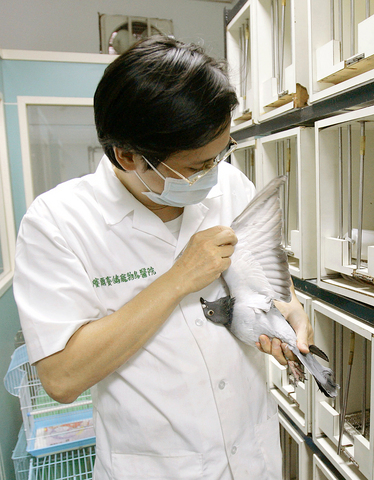Pigeon racing traces its roots to Europe, but Taiwanese have made it their own.
Every year, dozens of racing associations wager tens of millions of NT dollars on birds entered in grueling five-race competitions, while owners of the winners take home huge purses.
It has become such a big business that there are now pigeon hospitals catering to injured competitors with state-of-the-art techniques. And there are birdnappers who ransom the birds.

PHOTO: WALLY SANTANA, AP
Several times a year owners send their birds winging from one end of the island to the other, or flying from platforms at sea to Keelung 300km away.
Competitors are less than a year old and are chosen only after undergoing a rigorous training regime that emphasizes sticking to designated routes and building strength and perseverance.
The stakes are huge. Yeh Cheng-shen, chairman of the Taipei County Pigeon Racing Association and a participant in the sport for 54 of his 68 years, said he won NT$10 million (US$303,000) in a recent five-race meet. He estimated that meet's total pot at more than NT$2 billion.
"There's only one reason why pigeon racing is so popular in Taiwan -- gambling," he says.
Yeh, who estimates the value of his own racing flock in hundreds of thousands of NT dollars, says owners sustain significant losses during the races.
"Three thousand birds started our recent fall meet," he says. "Only 20 or 30 returned at the end of the event."
Yeh says most of the dropouts lose their way along the route, but some are trapped by criminals eager to exact ransoms.
"Gangsters erect these huge nets in valleys and other places the birds have to cross. Then they call the owner and offer to return the bird for what seems like a pretty reasonable price -- about NT$3,000," he says.
With the growth of racing, well-maintained bird hospitals have spread across the country.
The oldest is Taipei's Versele-Laga, established in 1985 by its current director, Li Jaw-yang, a graduate of Taiwan National University.
Li says about half of his clinic's patients are pigeons, nearly all of which are racers.
"Some are suffering from parasites, the kind of malady that any bird is prone to," he says. "But by far the most frequent problem involves injuries they sustain while racing. It's a very difficult sport."

UNILATERAL MOVES: Officials have raised concerns that Beijing could try to exert economic control over Kinmen in a key development plan next year The Civil Aviation Administration (CAA) yesterday said that China has so far failed to provide any information about a new airport expected to open next year that is less than 10km from a Taiwanese airport, raising flight safety concerns. Xiamen Xiangan International Airport is only about 3km at its closest point from the islands in Kinmen County — the scene of on-off fighting during the Cold War — and construction work can be seen and heard clearly from the Taiwan side. In a written statement sent to Reuters, the CAA said that airports close to each other need detailed advanced

Tropical Storm Fung-Wong would likely strengthen into a typhoon later today as it continues moving westward across the Pacific before heading in Taiwan’s direction next week, the Central Weather Administration (CWA) said. As of 8am, Fung-Wong was about 2,190km east-southeast of Cape Oluanpi (鵝鑾鼻), Taiwan’s southernmost point, moving westward at 25kph and possibly accelerating to 31kph, CWA data showed. The tropical storm is currently over waters east of the Philippines and still far from Taiwan, CWA forecaster Tseng Chao-cheng (曾昭誠) said, adding that it could likely strengthen into a typhoon later in the day. It is forecast to reach the South China Sea

Almost a quarter of volunteer soldiers who signed up from 2021 to last year have sought early discharge, the Legislative Yuan’s Budget Center said in a report. The report said that 12,884 of 52,674 people who volunteered in the period had sought an early exit from the military, returning NT$895.96 million (US$28.86 million) to the government. In 2021, there was a 105.34 percent rise in the volunteer recruitment rate, but the number has steadily declined since then, missing recruitment targets, the Chinese-language United Daily News said, citing the report. In 2021, only 521 volunteers dropped out of the military, the report said, citing

WEATHER Typhoon forming: CWA A tropical depression is expected to form into a typhoon as early as today, the Central Weather Administration (CWA) said yesterday, adding that the storm’s path remains uncertain. Before the weekend, it would move toward the Philippines, the agency said. Some time around Monday next week, it might reach a turning point, either veering north toward waters east of Taiwan or continuing westward across the Philippines, the CWA said. Meanwhile, the eye of Typhoon Kalmaegi was 1,310km south-southeast of Oluanpi (鵝鑾鼻), Taiwan’s southernmost point, as of 2am yesterday, it said. The storm is forecast to move through central